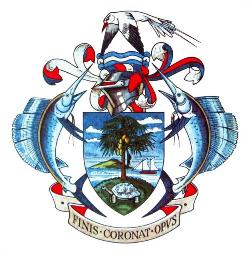

REPUBLIC OF SEYCHELLES
• Official name: Republic of Seychelles
• Location: Indian Ocean
• International organisations: African, Caribbean and Pacific Group of States,
African Union, on-Aligned Movement, United Nations
• Borders: None
• Coastline: Indian Ocean
• Land area: 455 Km2
• Population: 84,000
• Annual GDP (PPP) per capita: US$19,400 (2009 CIA estimate). World ranking: 47
• Ethnicity: The people of the Seychelles are of mixed French, African, Indian and Arab descent.
• Languages: French and English are the official languages. English is the language of government, business and the
media.
• Religion: Most of the popuation are Catholic Christians.
• Form of government: Presidential democratic republic. Sechelles is divided into 27 districts.
• Capital: Victoria
• Constitution: The
Constitution of Seychelles came into effect on 18 June 1993.
• Head of state: The President, elected by direct universal suffrage for a five-year term.
• Head of government: The President, who appoints all ministers.
• Legislature: Seychelles has a unicameral legislature, the National Assembly / Assemblee
Nationale, which has 34 members: 25 are elected from single-member constituencies and nine by
proportional representation. The legislature has no website.

• Electoral authority: None known
• Freedom House 2009 rating: Political Rights 3, Civil Liberties 3
Political history
The Seychelles were discovered by the Portuguese in about 1500, and were claimed by France in
1756. The French administered the islands from Mauritius, and when Mauritius passed to the
British in 1814, so did the Seychelles. They did not become a separate British Crown Colony
until 1903. Internal self-government was granted in 1970 and full independence followed in June
1976. The first President, Sir James Mancham, was overthrown by a coup in June 1977.
France-Albert Rene then put himself at the head of a one-party socialist regime which lasted
until 1993, when Rene allowed a new democratic constitution and free elections. He continued in
office until his retirement in 2004 and was succeeded by
James Michel.
Rene's socialist party, the Progressive Front of the
Seychelles People (SPPF), continues to
dominate Seychelles politics. Opposition comes from two non-socialist parties, the
Seychelles National Party and the Democratic Party.
Freedom House's 2009
report on Seychelles
says: "Seychelles is an electoral democracy. The July 2006 presidential election and the 2007
parliamentary polls were generally viewed as having met basic international norms of legitimacy.
However, the ruling SPPF's control over state resources and most media gives its candidates a
significant advantage at the polls... The opposition SNP has claimed that its sympathisers are
harassed by police and victimised by job-related security investigations in the public sector...
Concerns about the extent of government corruption have focused on the lack of transparency in
privatisation and the allocation of government-owned land... Seychelles was ranked 55 out of 180
countries surveyed in Transparency International's 2008 Corruption Perceptions Index...
The government controls much of the islands' media, operating radio and television stations...
The constitution endorses freedoms of assembly and association. Private human rights groups and
other nongovernmental organisations operate in the country... Judges generally decide cases
fairly but still face interference in cases involving major economic or political interests."
Updated July 2010
|

